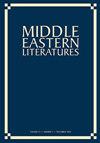Orphanhood and allegoresis in Raḍwā ʿĀshūr’s Granada Trilogy
IF 0.2
4区 文学
0 LITERATURE
引用次数: 0
Abstract
ABSTRACT Challenging Fredric Jameson’s vision of Third-World literature as national allegory in the shadow of globalization, this article reads Raḍwā ʿĀshūr’s 1990s Thulāthiyyat Gharnāṭah (Granada Trilogy) as a late capitalist allegory of the global South. In the Trilogy, ʿĀshūr places the plight of Castilian Granada’s occupied Arab-Muslim population in dialogue with the experiences of enslaved Andalusians and Native American victims of settler colonial violence across the Atlantic. ʿĀshūr marks the orphan as a messianic figure of human liberation, whose experience of dispossession and uprooting provides them with the critical perspective to re-narrate and connect disparate struggles against colonial violence. Reading the Trilogy intertextually, I will argue that ʿĀshūr’s dramatization of allegorical reading in times of grand political upheaval reflects her own attempt to transcode histories of dispossession across time and space in the present.Raḍwā - Āshūr《格拉纳达三部曲》中的孤儿与暗喻
本文挑战弗雷德里克·詹姆逊将第三世界文学视为全球化阴影下的民族寓言的观点,将Raḍwā - Āshūr 1990年代的《格拉纳达三部曲》(Thulāthiyyat Gharnāṭah)解读为全球南方的晚期资本主义寓言。在三部曲中,Āshūr将卡斯蒂利亚格拉纳达被占领的阿拉伯-穆斯林人口的困境与被奴役的安达卢西亚人和美洲原住民的经历进行了对话,这些人在大西洋彼岸的定居者殖民暴力中受害。伊拉Āshūr将孤儿标记为人类解放的弥赛亚人物,他们被剥夺和连根拔起的经历为他们提供了批判性的视角来重新叙述和连接反对殖民暴力的不同斗争。通过对三部曲的互文解读,我认为,在重大政治动荡时期,al - Āshūr对寓言阅读的戏剧化,反映了她自己在当下跨越时间和空间对被剥夺的历史进行转译的尝试。
本文章由计算机程序翻译,如有差异,请以英文原文为准。
求助全文
约1分钟内获得全文
求助全文

 求助内容:
求助内容: 应助结果提醒方式:
应助结果提醒方式:


